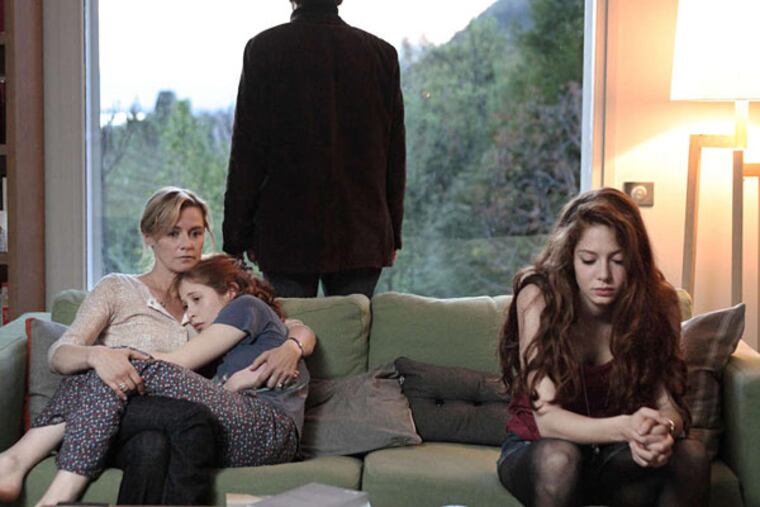Accent's on zombies
French series "The Returned" taps into preoccupation with our own ends of days.

* THE RETURNED. 9 p.m. tomorrow, Sundance Channel.
* TIME OF DEATH. 9 p.m. Friday, Showtime.
A BUS packed with high-school students skids on the curve of a mountain road and plunges over a cliff in the opening moments of "The Returned," beginning tomorrow on Sundance Channel.
As a small town is left to grieve, there are echoes of Atom Egoyan's 1997 film "The Sweet Hereafter" before the story veers in a very different direction. One of the girls on the bus, Camille (Yara Pilartz), returns home, four years after her family buried her.
A haunting, beautifully executed French series, whose horror reveals itself so gradually that it may be Thanksgiving before you fully understand why what feels at times like a wonderful dream is premiering on Halloween, "The Returned" is more than a zombie show for those of us who'd rather read subtitles for eight hours than see one more decaying face run through with a sharp stick. It's also the latest bearer of a message that popular culture seems determined to deliver:
We may miss our dead, but we do not want them back.
Not as staggering, flesh-eating zombies, the teeming and terrifying masses who've helped make AMC's "The Walking Dead," yesterday renewed for a fifth season, TV's top show among 18- to 49-year-olds.
And not, it seems, as attractive French people, walking and talking normally and looking, for a while, at least, exactly the way their loved ones remember them. Camille returns to find that her twin sister, Lena (Jenna Thiam), now an angry near-stranger, has reached drinking age in her absence and that their parents' marriage has fractured.
She will not be the last in this curiously isolated mountain community to find that life has moved on in his or her absence.
Loosely based on a 2004 French film that envisioned a more global homecoming, "The Returned" isn't the only new series to play with this idea. In "Resurrection," scheduled to premiere on ABC on March 9, the small town of Arcadia, Mo., copes with its own influx of returnees, beginning with a young boy who returns to his aging parents decades after he died.
(As if to maximize confusion, the ABC show, originally titled "The Returned," is based on a novel of that name by Jason Mott that was published only last month.)
The BBC, meanwhile, is in production on Season 2 of "In the Flesh," its series about zombies being repatriated to a British village whose residents have been fighting off the walking dead for some time and aren't ready to embrace those now under treatment for something called Partially Deceased Syndrome.
The first season, which made its U.S. debut on BBC America this past summer, featured more of the classic trappings of the zombie genre than "The Returned" (for which a second season is also planned) but still managed to reflect the anxieties of a culture that's both preoccupied by death and repelled by it.
It may be that my generation, picking up speed as it passes through the stages of life like the pig in a python - and beginning to realize that this snake doesn't go on forever - is having its usual overwhelming effect on everyone else's media, even as we grow too old to interest many advertisers. I'm seeing more interest in stories where the aftermath of death isn't limited to a homicide investigation.
As unsatisfying as the U.S. version of "The Killing" may have been in its first season, it at least distinguished itself in being willing to linger on the raw grief of a family that had lost a child, something also explored in BBC America's "Broadchurch" (which Fox plans to remake).
And "Lost" co-creator Damon Lindelof's next project, a series for HBO based on Tom Perrotta's novel The Leftovers, is almost the flip side of "The Returned," dealing with those left behind after a Rapture-like event claims people who may or may not have been considered deserving.
But it's Showtime - which wrapped up four seasons of "The Big C" this year with four hourlong episodes that chronicled the death of the show's main character (Laura Linney) - that has gone further than most networks in its willingness to look at death as more than an aberration.
On Friday, it introduces "Time of Death," an unflinching, six-episode documentary series about dying, from producers better known for classy but not PBS-like "reality" shows like "Project Runway" and "Top Chef."
"We live in a death-denying culture, and I don't want it to be that way. I want my life to have made some difference," says Lenore, who has pancreatic cancer and is one of the subjects of the show's second episode.
A longtime grief counselor who's been given three to six months to live and has chosen to forgo aggressive treatment, Lenore could be a poster child for the hospice movement.
Better prepared for death than some others in the show, she's nevertheless surprised by the process, reflecting, as she lies in bed during her own 75th birthday party, that "it's not easy to die, and I didn't know that as fully as I know it now."
While it's not always easy to watch "Time of Death," which is bound to trigger memories for those who've logged time with the dying, it's a gift to spend time with its highly individual subjects, who resist a one-size-fits-all approach.
It's also interesting to see an escapist medium turning its attention to a reality from which there is apparently still no escape.
On Twitter: @elgray
Blog: ph.ly/EllenGray